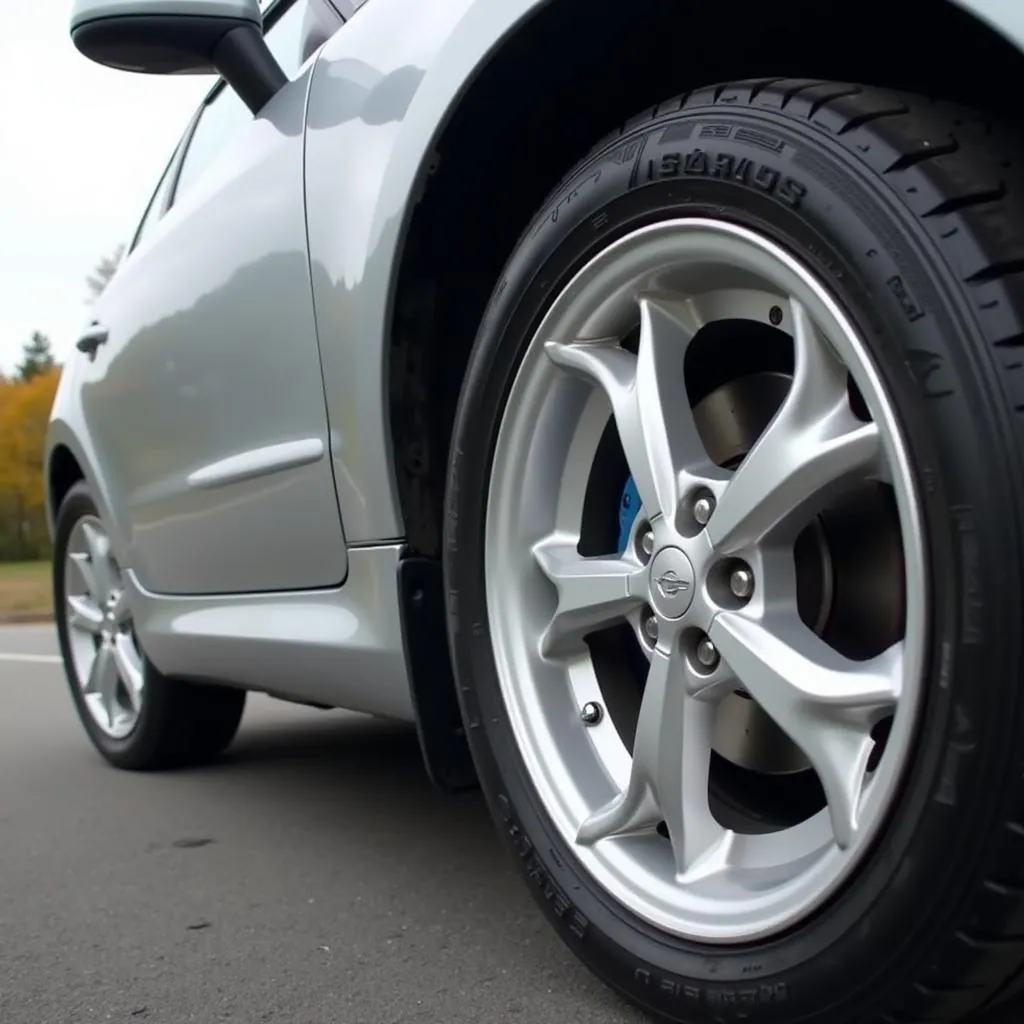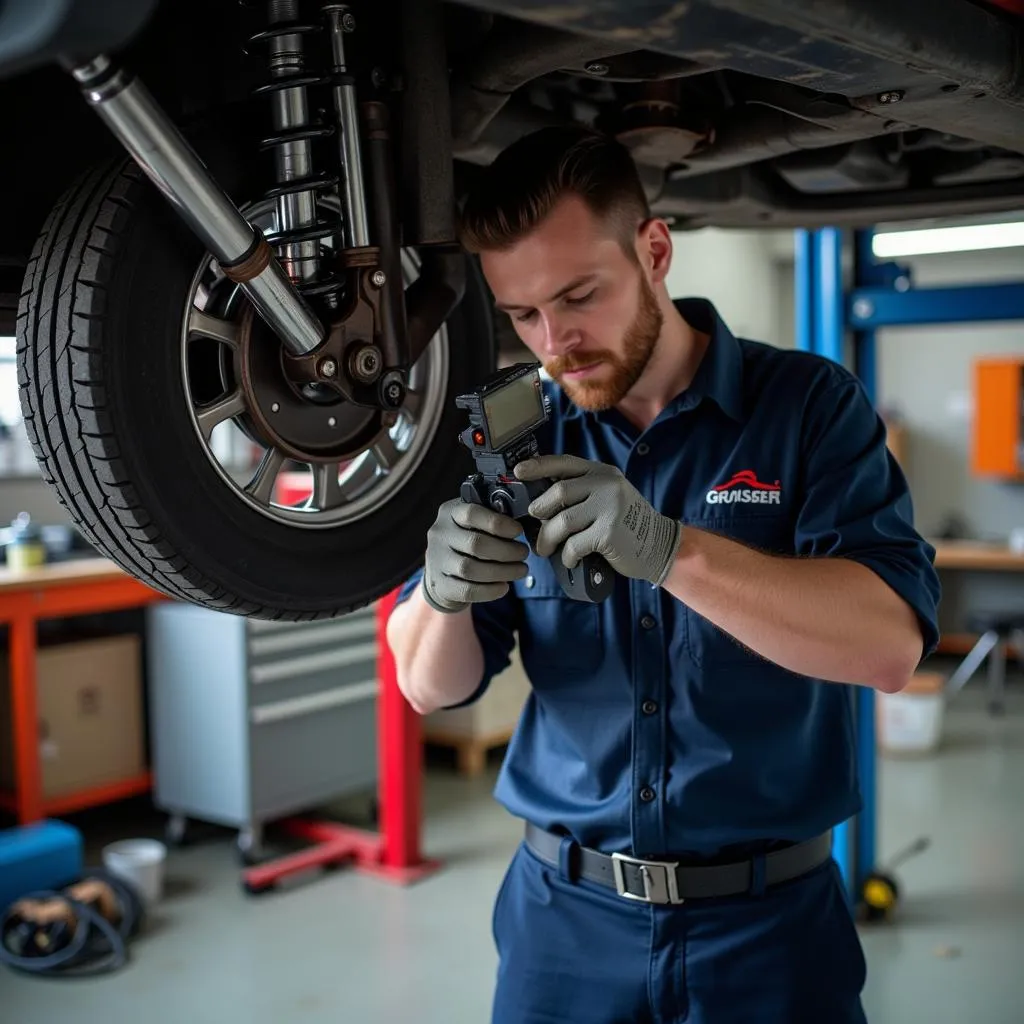Experiencing vibrations or shaking in your car while driving at 50 mph can be an unnerving experience. This issue can stem from a variety of factors, ranging from simple tire problems to more complex issues with your vehicle’s suspension or engine. This article will delve into the common causes of car shaking at 50 mph and provide you with the information needed to diagnose and address this problem.
 Car shaking at 50 mph due to tire imbalance
Car shaking at 50 mph due to tire imbalance
Common Causes of Car Shaking at 50 MPH
1. Tire Problems: One of the most frequent culprits behind car shaking at specific speeds, such as 50 mph, is tire-related issues.
- Tire Imbalance: When your tires aren’t properly balanced, meaning the weight distribution isn’t even, it can cause vibrations that become particularly noticeable at higher speeds like 50 mph.
- Wheel Alignment: Misaligned wheels can also lead to shaking. This occurs when your wheels aren’t pointing in the correct direction, causing your car to pull to one side and potentially vibrate.
- Damaged Tires: A bulge in the sidewall of your tire or a flat spot from hard braking can also cause shaking.
2. Suspension Issues: Your car’s suspension system is responsible for a smooth ride by absorbing shocks from the road. If components within the suspension are worn or damaged, it can lead to shaking, especially at higher speeds.
- Worn Shocks or Struts: Shocks and struts help dampen the bouncing motion of your car’s suspension. Worn-out shocks or struts can lead to excessive bouncing and vibrations.
- Damaged Control Arms: Control arms connect your car’s suspension to the frame. If they’re bent or damaged, it can affect your wheel alignment and cause vibrations.
3. Engine Problems: While less common, problems with your engine can also cause car shaking at 50 mph.
- Misfiring Spark Plugs: If your spark plugs aren’t igniting the fuel in the cylinders properly, it can cause your engine to misfire, leading to vibrations.
- Clogged Fuel Injectors: Fuel injectors spray fuel into the engine cylinders. If they become clogged, it can disrupt the fuel-air mixture and cause vibrations.
How to Diagnose the Cause of Shaking
Diagnosing the exact cause of your car shaking at 50 mph often requires a mechanic’s expertise. However, you can perform a few checks yourself to narrow down the possibilities:
- Visual Inspection: Examine your tires for any visible signs of damage, such as bulges, cuts, or uneven wear patterns. Also, check for loose lug nuts.
- Listen for Unusual Noises: Pay attention to any unusual noises coming from your car, such as clunking, banging, or grinding, which could indicate a suspension problem.
- Check Your Steering Wheel: If you notice vibrations in the steering wheel specifically, it often points to a tire or wheel alignment issue.
 Mechanic inspecting car suspension system
Mechanic inspecting car suspension system
How to Fix Car Shaking at 50 MPH
The solution for your car shaking at 50 mph depends entirely on the underlying cause. Here are the common fixes associated with each issue:
- Tire Balancing: A mechanic can balance your tires by adding small weights to the wheel rims, ensuring even weight distribution.
- Wheel Alignment: Wheel alignment involves adjusting the angles of your wheels to ensure they are parallel to each other and perpendicular to the ground.
- Tire Replacement: If your tires are damaged or excessively worn, replacement is often the safest option.
- Suspension Repair: Repairing or replacing worn suspension components, such as shocks, struts, or control arms, can eliminate shaking caused by suspension issues.
- Engine Tune-Up: If engine problems are suspected, a tune-up involving spark plug replacement, fuel injector cleaning, and other engine maintenance can resolve the issue.
Conclusion
Experiencing car shaking at 50 mph can be concerning, but understanding the common causes and solutions can help you address the problem effectively. Remember, while some checks can be done at home, it’s always best to consult with a qualified mechanic to diagnose and fix any car issues, ensuring your safety on the road.
FAQs
1. Can driving on a flat tire cause shaking at 50 mph?
Yes, driving on a flat tire can cause severe shaking and is extremely dangerous. Never drive on a flat tire.
2. How often should I get my tires balanced?
It’s generally recommended to get your tires balanced every 5,000 to 7,500 miles or whenever you get new tires installed.
3. Can worn brake rotors cause shaking at 50 mph?
While worn brake rotors typically cause vibrations while braking, they can potentially contribute to shaking at higher speeds in severe cases.
Need further assistance?
Contact us via WhatsApp: +1(641)206-8880, Email: [email protected] or visit us at 276 Reock St, City of Orange, NJ 07050, United States. Our customer service team is available 24/7 to assist you.